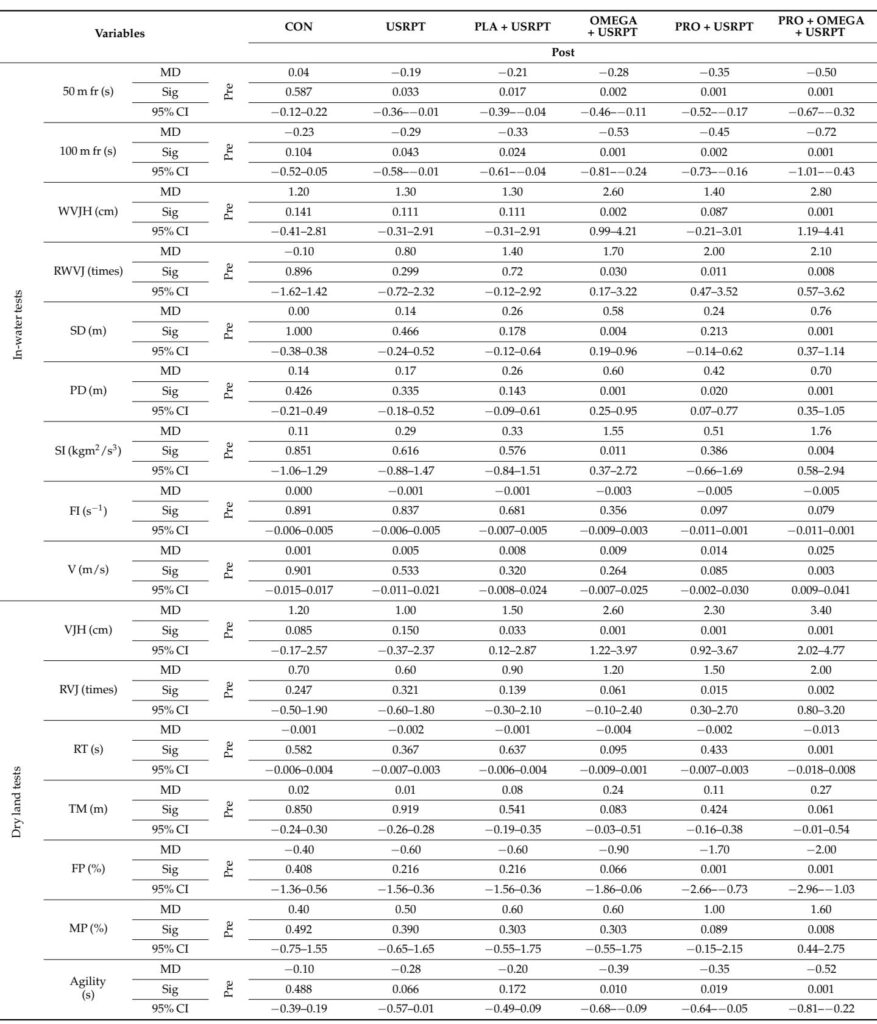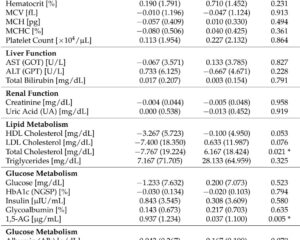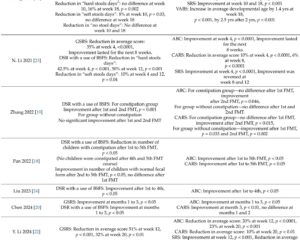Introduction
Swimming, particularly sprint disciplines, demands exceptional anaerobic power, neuromuscular responsiveness, and efficient recovery to maximize competitive performance. Beyond rigorous training, nutritional strategies that modulate systemic inflammation, immune function, and nutrient absorption have emerged as promising adjuncts to enhance athletic adaptation. Probiotic supplementation, through beneficial modulation of gut microbiota, supports intestinal barrier integrity and immune defenses, potentially mitigating exercise-induced stress. Concurrently, omega-3 fatty acids, notably EPA and DHA, exert anti-inflammatory actions and favor muscle protein synthesis pathways, contributing to improved recovery and muscle function. Ultra-short race pace training (USRPT) represents a targeted high-intensity interval approach that mimics competitive sprint swimming demands by subdividing race distances into brief, maximal-effort repetitions, promoting physiological adaptations specific to sprint performance execution.
This article synthesizes recent evidence assessing the combined effects of probiotics and omega-3 fatty acid supplementation alongside USRPT on sprint swimming performance. We highlight physiological mechanisms, study design, key outcomes, and clinical implications for optimizing swimmer training and nutrition.
Study Design and Methods
A randomized, double-blind, placebo-controlled trial enrolled 60 male competitive sprint swimmers averaging 23.2 years of age and over five years of training experience. Participants were allocated into six groups (n=10 each): Control (CON), USRPT only, Placebo plus USRPT (PLA+USRPT), Probiotics plus USRPT (PRO+USRPT), Omega-3 plus USRPT (OMEGA+USRPT), and combined Probiotics and Omega-3 plus USRPT (PRO+OMEGA+USRPT).
The intervention lasted eight weeks, during which all training groups performed thrice-weekly USRPT sessions consisting of 17 sets of 25 m and 12.5 m sprints at individually tailored race pace, with progressively increasing repetitions weekly. Supplement groups received daily capsules: a multi-strain probiotic formulation totaling 4.5×10¹¹ CFU or 1000 mg fish oil capsules rich in EPA (500 mg) and DHA (180 mg), or both combined. Placebo capsules matched in appearance were administered to control groups. Compliance exceeded 95% based on pill counts and logs.
Primary performance endpoints included sprint times (50 m and 100 m freestyle), anaerobic capacity metrics (sprint index, velocity), neuromuscular tests (vertical jump height, reaction time), and body composition measures (body fat and muscle mass percentages). Testing was conducted pre- and post-intervention under standardized conditions.
Key Findings
The combined PRO+OMEGA+USRPT group exhibited the most substantial improvements among all cohorts. Sprint times decreased significantly by 1.92% (~0.5 s) in the 50 m freestyle (p=0.002, η²=0.286) and 2.48% (~0.7 s) in the 100 m freestyle (p=0.041, η²=0.229), with significant interaction effects indicating superior temporal gains compared to other groups.
Notably, the sprint index improved markedly (p=0.013, η²=0.139), reflecting enhanced anaerobic power output, and reaction time was reduced significantly (p=0.009, η²=0.241), indicating heightened neuromuscular responsiveness. Vertical jump tests revealed improvements in explosive power, both in-water and on dry land, reinforcing the functional transfer of training and supplementation effects.

Body composition changes were favorable, with the PRO+OMEGA+USRPT group demonstrating significant muscle mass increases and body fat reductions, which likely contributed to biomechanical efficiency and energy utilization during sprint efforts.
Single supplementation groups (PRO+USRPT and OMEGA+USRPT) also showed performance enhancements, although typically less pronounced than the combined intervention. Control and placebo groups exhibited minimal or non-significant changes.
No adverse effects were reported, and the fatigue index did not differ significantly among groups, suggesting the interventions improved performance factors without compromising fatigue resistance within the study timeframe.
Mechanistic Insights and Expert Commentary
Probiotics may ameliorate intestinal barrier function and modulate systemic inflammatory responses, reducing exercise-induced gastrointestinal and immune perturbations. Specific strains applied in this protocol (e.g., Lactiplantibacillus plantarum BP06, Bifidobacterium longum BL03) have documented anti-inflammatory properties and effects on muscle recovery pathways. The enhanced nutrient absorption and immune regulation likely supported improved anaerobic energy metabolism and resilience during intense USRPT sessions.
Omega-3 fatty acids contribute through anti-inflammatory lipid mediators, attenuation of oxidative stress, and upregulation of anabolic signaling such as AKT/mTOR, fostering muscle repair, growth, and mitochondrial biogenesis. Together, these actions can facilitate neuromuscular adaptations and reduce muscle damage from high-intensity training.
The synergistic effects observed surpass additive expectations, potentially due to omega-3-induced enhancement of gut microbiota diversity complementing probiotic colonization and function, fostering a synbiotic-like environment. This integrated approach may optimize systemic recovery and energy metabolism more effectively than individual components.
These findings align with and extend prior literature demonstrating modest benefits of probiotics or omega-3s alone for athletic performance, underscoring the relevance of combining targeted nutrition with specialized training like USRPT for maximal sprint performance gains.
Limitations and Future Directions
Limitations include the exclusive focus on male swimmers, limiting generalizability to female athletes or other sports disciplines. The eight-week intervention period precludes conclusions about long-term sustainability. Gut microbiota composition and inflammatory biomarkers were not measured, leaving mechanisms inferred rather than directly observed. Dietary intake beyond supplementation was not strictly controlled, posing potential confounders.
Future studies should incorporate female athletes, extended durations, mechanistic biomarkers (e.g., cytokines, lactate kinetics), and controlled dietary regimes. Assessment of synergistic interactions at the microbiome level will be critical to elucidate synbiotic effects.
Conclusions
Combining probiotics and omega-3 supplementation with ultra-short race pace training offers a promising strategy to synergistically enhance sprint swimming performance. This integrated approach improves anaerobic power, neuromuscular responsiveness, and body composition in competitive male sprint swimmers beyond USRPT or supplementation alone. These outcomes provide actionable insights for optimizing training and nutrition regimens in aquatic sports. Further mechanistic and longitudinal research is warranted to consolidate these findings and inform personalized athlete support.
References
1. Maymandinejad I, Hemmatinafar M, Jäger R, Imanian B, Koushkie Jahromi M, Suzuki K. Synergistic Effects of Probiotic and Omega-3 Supplementation with Ultra-Short Race Pace Training on Sprint Swimming Performance. Nutrients. 2025;17(14):2296. DOI:10.3390/nu17142296 IF: 5.0 Q1 2. Jäger R, Mohr AE, Carpenter KC, et al. International Society of Sports Nutrition Position Stand: Probiotics. J Int Soc Sports Nutr. 2019;16:62.
3. Gibson GR, Hutkins R, Sanders ME, et al. Expert consensus document: ISAPP consensus statement on the definition and scope of prebiotics. Nat Rev Gastroenterol Hepatol. 2017;14(8):491-502.
4. Rushall B. Ultra-short race pace training (USRPT) in swimming: Rationale and application. Swim Sci Bull. 2013;40:11.
5. Lee CC, Liao YC, Lee MC, et al. Effects of Lactiplantibacillus plantarum strains on exercise performance. Microorganisms. 2022;10(11):2181.
6. Therdyothin A, Prokopidis K, Galli F, Witard OC, Isanejad M. Effects of omega-3 polyunsaturated fatty acids on muscle and whole-body protein synthesis: A systematic review and meta-analysis. Nutr Rev. 2024;83(6):e131-e143.

